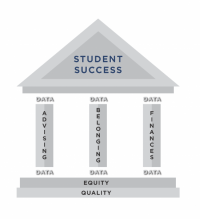UT System undergraduates bring to our institutions a rich tapestry of assets and experiences: they come from diverse backgrounds; 57% are underserved minorities; many of them have prior work experience; and many are bi-lingual in Spanish.
At the same time, many of our students face challenges related to coming from low-income backgrounds: approximately 40% across the system are Pell eligible, and that number is as high as 61.8% at one UT institution. Many of our undergraduate students are transfers, and in fact only 65% of the entering 2017 cohort were first-time in college. Visit the UT System Dashboard for additional information on the students who attend our institutions.
In collaboration with campuses, we seek to become more data-informed, student-ready, intentional, and holistic in our approach to student success, with a focus on ensuring equitable access, participation and excellence for all students in high-quality programs and experiences, in the classroom and beyond.
Pillar Commitments
The UT System organizes its undergraduate student success work around three aspirational pillars:
 |
|
How are UT institutions meeting these commitments?
- Finances
- UT institutions are committed to funding all tuition and fees for students whose families earn a gross income under a certain threshold.
- Many UT institutions keep residence halls open during holidays to assist students in need.
- All academic universities are working to ensure that students' basic needs are met, through on-campus food, clothing and household items pantries.
- Many UT institutions have identified or are in the process of identifying emergency aid programs and assembling other resources to address housing insecurity.
- Some UT institutions are working with the Office of Institutional Research and Analysis to develop predictive analytic tools to distribute financial aid dollars more effectively to students in need.
- Advising
- All academic universities have peer tutoring and/or peer mentoring programs—effective for the students in need of extra academic support, high-impact programs for the student peer tutors and mentor.
- With funding from UT System, every academic university has a graduation help desk in place—one-stop shops (virtual and/or brick-and-mortar) for students who encounter barriers in the path to timely graduation and have nowhere else to turn.
- UT institutions are promoting "15-to-Finish" and "Take 30" campaigns, including intentionally ramped-up advising, to help guide students take full-credit course loads toward timely completion of their degrees.
- Belonging
- All nine academic universities offer a variety of innovative and award-winning curricular programs for first-year students, including cohort-based learning communities, and freshmen signature courses and seminars.
- UT Dallas's Quality Enhancement Plan (QEP), Orbit: Keeping New Comets on Course, is aimed to improve student services for all new UT Dallas students: first-time-in-college students, transfer students, international students, and graduate students. MORE
- ¡Bienvenidos! is a UTEP Edge campaign to articulate and elevate a campus culture of student belonging, engagement, and lifelong success. MORE
- UT institutions provide many co-curricular programs for students, including those addressing the needs of first-generation and low-income students, veterans, and transfer students.
- High-impact practices—HIPS—abound across the UT System, providing students opportunities to belong and engage more deeply in their learning through internships, service learning, undergraduate research, domestic and international study abroad, and others.
- All nine academic universities offer a variety of innovative and award-winning curricular programs for first-year students, including cohort-based learning communities, and freshmen signature courses and seminars.
How is the UT System supporting institutions in meeting these commitments?
-
Advising in the UT System – To advance the Advising pillar of the UT System’s student success framework, the UT System works hard to recognize and support advisors and advising. Support includes amplifying the 5E Framework for Advising Excellence, developed by the Advising Affinity Group in 2017, and convening annual advising institutes. MORE
-
Transfer in the UT System – UT institutions are dedicated to facilitating the successful transfer of students into and out of the System’s universities, helping students complete degrees in an affordable and timely manner, and removing barriers that stand in their way. MORE
-
Student Success Guiding Coalition – A system-convened collective of student success leaders and advocates working to generate, maintain and accelerate momentum in student success efforts and initiatives. MORE
-
Affordable Learning Accelerator Task Force – Convened in April 2019 to support and accelerate institutional efforts to expand the availability and affordability of high-quality, low- or no-cost, cutting-edge and next-generation instructional and learning resources to students. MORE
-
Affinity Groups – Between February and December 2017, affinity groups were convened to focus and deliver on key outcomes of the UT System's initiative to make significant progress in student success. Affinity groups of Finances, Advising and Belonging, and the Assessment of Student Learning affinity group, met to MORE
-
Grants to support institutional projects – In February 2017, the University of Texas System Board of Regents approved $10 million to be awarded to University of Texas academic universities in support of former Chancellor McRaven's Student Success Quantum Leap. Through a competitive process, five University of Texas institutions were awarded funding for six innovative, campus-based projects designed to enhance student success. All eight academic universities received funding for Graduation Help Desks. MORE
-
Professional Development – The UT System provides professional development opportunities to cohorts of faculty and academic and student affairs staff, to enhance institution-wide engagement with, and greater responsibility for student success. MORE
-
Predictive Analytics – Mining historical and current student and institutional data, the UT System Office of Institutional Research Analysis works with UT institutions to develop a variety of predictive analytic tools, designed to help greater numbers of students from across demographic groups to enroll, persist, and complete their educations, and with a focus on increasing financial well-being and academic and social belonging.
UT Institution Initiatives
Please consult campus websites for additional information on institution-specific initiatives focused on undergraduate student success.

